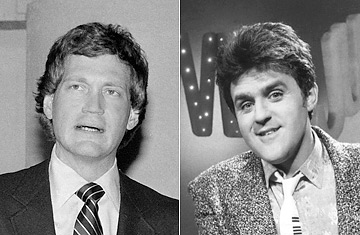
Comedians David Letterman and Jay Leno
For the stand-up comics who had spent years giving away their jokes for free at Mitzi Shore's Comedy Store, the Norma Rae moment came late one night at Canter's Deli. A few of the Store regulars were lingering in a booth when Jay Leno walked in and cried, "What is this bullshit?"
The line had had a long setup. Ever since getting custody of the Comedy Store in 1974, Mitzi Shore had stuck to her policy against paying the comedians who put customers in the seats. In this she was no different from her counterparts in New York, Budd Friedman and Rick Newman. They regarded their establishments not as ordinary nightclubs but as workshops, where comedians could try out new material, hone their acts, and be seen by people in the industry. The comics were getting as much out of the clubs as the clubs were getting out of them; besides, the owners claimed, paying all the acts — a dozen or more a night — would have been financially prohibitive. But for Mitzi, the issue of whether to pay the talent was more personal. She saw her club as a college of comedy, an "artists' colony," and it wasn't just her bottom line that would suffer if that talent were to earn a few bucks for their effort. It was the very integrity of the art form.
The comedians may not have bought into this, but for most of the '70s they tolerated it. They worked for no pay at the Comedy Store because that's how they got seen by the agents and bookers and producers who could be their ticket to the real paying jobs — a TV guest shot, a club gig out of town, maybe even a part in a sitcom or movie. Landing good time slots at the Comedy Store was too important to risk alienating the club owner who put together the nightly lineups.
But by early 1979 the comics were growing restive. For one thing, Mitzi Shore's little artists' colony was the center of a growing comedy empire. Along with her two clubs in the L.A. area and another one down the coast in La Jolla, she had started a college concert tour featuring comics from the Comedy Store and signed a creative-consultant deal with ABC to develop TV projects. She had expanded her original club as well, opening a second showroom, dubbed the Main Room, where she intended to feature (and pay for) top comics from Vegas and TV.
But many of the big-name comics she tried to hire for the Main Room turned her down, and the ones who did work there weren't doing much business. "Mitzi was just crestfallen," says Argus Hamilton, the young comic from Oklahoma who was her errand boy and confidant at the time. "She had built that room for Buddy Hackett, Don Rickles, Shecky Greene, Bob Newhart — all those guys, her ex-husband's generation, who were ruling the roost in Vegas at the time. They refused to play the Main Room because they thought it would hurt their Las Vegas draw." Hamilton and another comic, Biff Maynard, suggested that Mitzi instead try to fill the room with a bill of her Comedy Store regulars. So she put together a squad of her best acts — among them David Letterman, Jay Leno, and Robin Williams — and crowds packed the place. Even better, at least for Mitzi, because they were her very own "showcase" comics, who worked for free in the Original Room, she didn't feel the need to pay them. And that's what ticked off Leno and his pals. If hot young comics from the Original Room were good enough to fill the house in the Main Room, they reasoned, why shouldn't they get paid just like the Vegas headliners?
